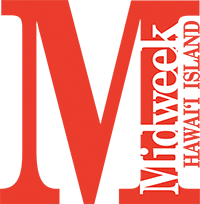The Power of Mana Up
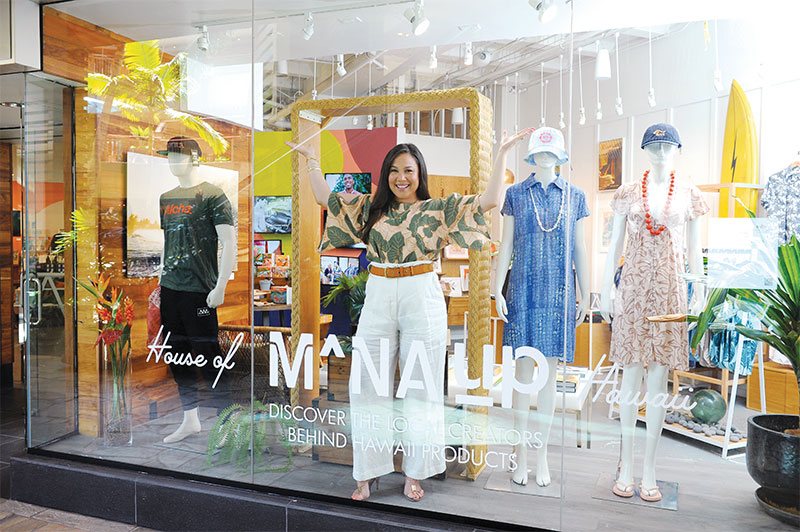
Meli James and Mana Up are growing the entrepreneurial landscape in Hawai‘i — and having a blast doing it. PHOTO BY LAWRENCE TABUDLO
There’s a price (literally) to living in paradise. But according to Mana Up co-founder Meli James, it doesn’t have to be this way.
“We can create this place where ideas can come to fruition in an innovative ecosystem,” she states. “Any idea that you have, you can build here in Hawai‘i — how amazing would that be? Now that I’ve been an entrepreneur and seen success with my businesses, (I wanted to) bring what I learned to Hawai‘i so more people can come home or stay home.”
James’ introduction to entrepreneurship was all boots on the ground after a quarter-life crisis made her shift gears from the hospitality industry to starting her own venture — a wine app called Nirvino — at the age of 27. Nirvino started in 2007 as a mobile website that helped people find good wines at the grocery store or restaurants, and then capitalized on Apple’s app store launch a year later by converting to a cell phone application that allowed online purchases.
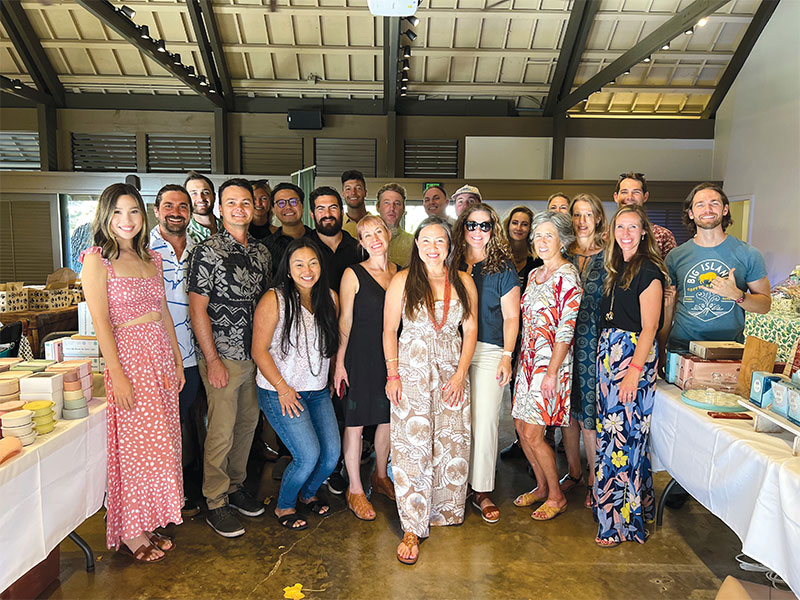
Mana Up cohort participants are able to collaborate, as well as learn from and help each other. PHOTO COURTESY MANA UP
“Back then, we had clunky smartphones that were expensive, and this was game-changing,” recalls James, who was living in tech-forward Silicon Valley at the time. “It was the first time in our lives we had the web at our fingertips.”
Through that experience, she fell in love with entrepreneurship and startups, and went on to launch other successful companies. That formula of having an idea and making a business out of it spoke to James, who wishes there were opportunities to learn the ins and outs of entrepreneurship back when she was in high school in the ’90s.
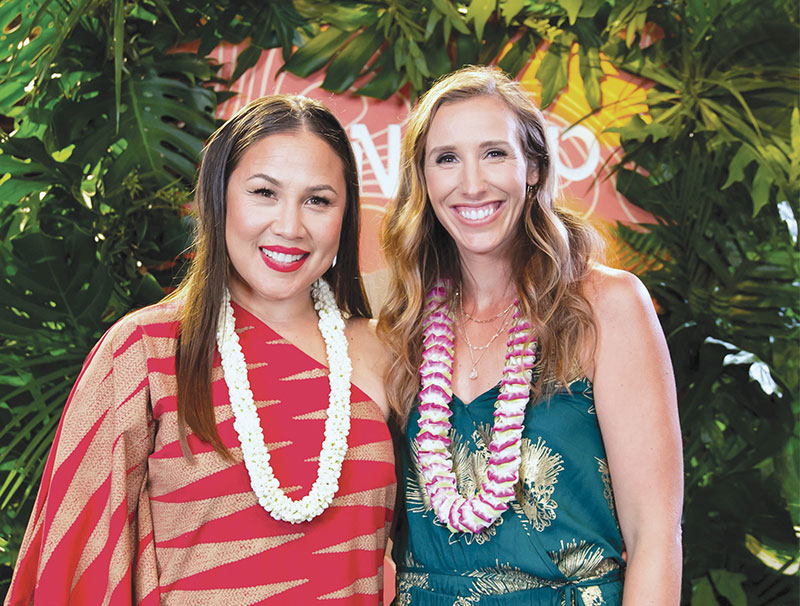
Mana Up co-founders Meli James (left) and Brittany Heyd. PHOTO COURTESY MANA UP
“It wasn’t even a word people knew how to spell yet,” she adds with a laugh.
Born and raised on O‘ahu, James went to the mainland for college and upon graduating faced the same doubts about her island home that many others have experienced.
“It was kind of this unspoken thing that if you really wanted to do something different, Hawai‘i wasn’t the place for that,” she says. “I felt like Hawai‘i wasn’t an option for me, and I felt like I had to stay on the mainland, so I did.”
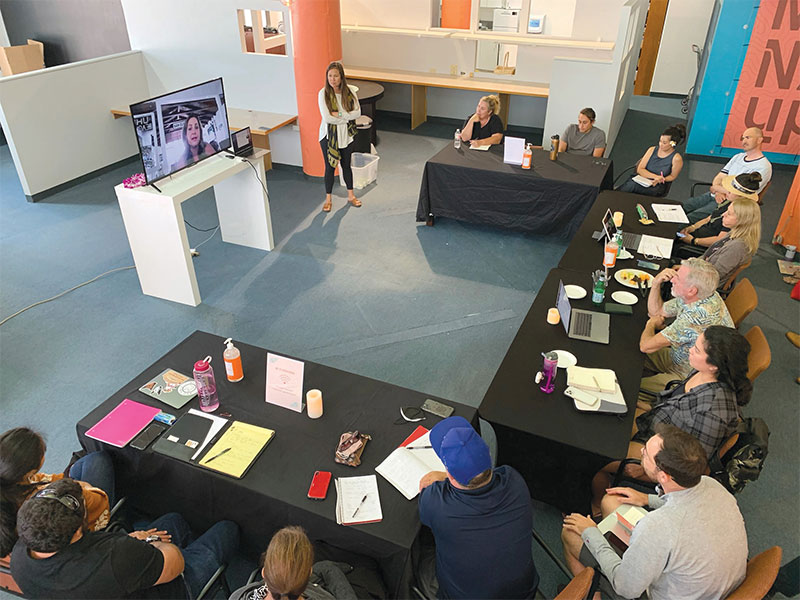
Mana Up Accelerator workshops take place one-on-one and in group sessions. PHOTO COURTESY MANA UP
But now, James has the ability to share that knowledge with forward-thinking islanders through Mana Up, giving them the opportunity and help she never had as a young adult.
Since James and company co-founder Brittany Heyd launched the small-business accelerator in 2017, 63 companies have gone through Mana Up’s accelerator program and grown their businesses by leaps and bounds. And, come Nov. 3, 11 more will join the ranks during a virtual graduation showcase.
“We had over 150,000 people watch our show last year,” James says. “It’s Shark Tank meets Oprah meets American Idol.”
It’ll be a time of celebration on a job well done and a chance to look back on six months of hard work that included intensive workshops on digital marketing, e-commerce, packaging, creating a narrative and building leadership, as well as hyperfocused one-on-one weekly sessions individually tailored to the specific business.
“We teach them the skills and how to look at the world as their customers,” explains Heyd, a California native who met and married a Maui boy and moved to the islands in 2016. “Instead of it taking them three years to learn something, how do we make it take six months? We vet resources and consultants to shorten the learning cycle, reduce mistakes and allow them to grow quicker.
“We pour fuel on the fire.” And even after the program, Mana Up is there to help. In addition to the great network of graduates, businesses that make it through a cohort can take part in Mana Up’s new Wayfinder series that helps them grow after hitting $1 million in annual revenue.
“When you’re an early founder, you’ve got your challenges. You’re wearing five different hats, using family and friends to help you. But now that you’re bigger, the company structure changes, as do you, and your challenges are totally different than when you started,” James says. “We think of it as our privilege to help these companies more through these later-stage challenges. They’re still here in Hawai‘i and still growing — how amazing is that? — and how can we help them get to $10 million or $20 million?”
To qualify for a cohort, the business has to be headquartered in the islands, have an annual revenue over $100,000 and elevate the 50th state brand.
“The brand of Hawai‘i is globally recognized,” James notes. “It’s loved around the world. We see tons of products and businesses on the mainland that use the brand of Hawai‘i that aren’t even here, so we know that it’s meaningful.”
Hawai‘i-made products are not just for the farmers market circuit or local pop-up events, though many get their start at venues like that. James, Heyd and the rest of Mana Up believe that local companies have the ability to fit in with internationally recognized brands in stores across the world. And it starts with a shift in mindset.
“You do belong in Bloomingdale’s or DFS, next to Tiffany & Co., Hermès and Saint Laurent; you fit right in at Neiman Marcus,” James says.
House of Mana Up (houseofmanaup.com), the organization’s retail arm that features products from its cohorts, is proof that what she says is true.
“It was a thesis of sorts,” she adds. “Can a store like this thrive on Kalākaua Avenue where the big boys are?”
The retail space on the ground floor of Royal Hawaiian Center is a hub for the best of the best local products, and also serves as a learning platform for entrepreneurs to get customer feedback by testing different messaging, products, packaging and more.
At every stage of the process, Mana Up is about accelerated growth to help entrepreneurs reach their full potential, and that extends to its Hawai‘i Rising and Power Up Your Business programs for indigenous and female business owners, respectively, too.
“Think about any founder,” James begins. “They start a company and they’ve got a great product, but now as a CEO, you’re supposed to have all these skills. We help them create confidence and build up their skills so they can walk into any meeting and know what they’re doing.”
She points to former small-time businesses that have since grown their markets overseas with much success — Hawaiian Host, Honolulu Cookie Co., Kona Brewing Co., to name a few — and asks the question: “How do we build more businesses like those that are here in Hawai‘i and stay in Hawai‘i?”
“We want to shift their mindset, think bigger and go bigger, and also looking at what these companies can do for Hawai‘i,” says James, who also serves as president of Hawai‘i Venture Capital Association.
She gives a poignant example: For a director of operations wanting to try something new, not many opportunities present themselves in Hawai‘i that would pay a competitive wage — hence the move to the mainland or overseas to pursue that dream. But Mana Up hopes to shift the tides. As a first step, its co-founders envision building up 100 product-based companies in Hawai‘i that each bring in $10 million in annual revenue, for at that level, businesses are able to create higher-paying, executive-level, decision-making jobs that are so sought-after.
“It lifts the tide for everyone from a talent/ability standpoint and people can move back home,” adds James.
This mentality also speaks to the abundance mindset Mana Up instills in businesses it works with. In addition to learning from seasoned business leaders, entrepreneurs can learn from each other in the process. If one company is dealing with supply chain issues, it’s common to call up another similar business in the Mana Up ‘ohana to get ideas on how to navigate the situation. The goal is to expand the Hawai‘i brand together, which means every person’s success helps the other one be more successful as well.
“The more we succeed as Hawai‘i, the more we’re going into these places that are nationally recognized,” Heyd notes. “We’re creating a brand for Hawai‘i that is globally recognized, and we’re building a reputation for high-quality products coming out of Hawai‘i.”
For more information, visit manauphawaii.com.
